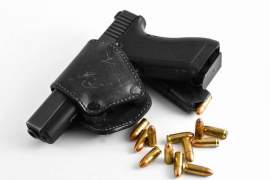
Tennessee Gun Laws

Tennessee gun control laws are considered to be some of the least-restrictive in the United States. No permit is required to purchase a firearm per the state's gun control laws. Any person aged over 18 years is eligible to purchase a firearm, as long it is classified as a shotgun or rifle.
A minor may acquire a firearm on the basis that the weapon is given on loan under permission by an adult, and for the purposes of hunting, camping, or other legal sporting activity involving firearms. However, as per gun purchasing laws referring to acquisition of a handgun, the purchaser must be subject to approval pending a criminal history background check conducted by the Bureau of Investigation of the state, and administered by the licensed dealer at the time of the handgun purchase.
Furthermore, the licensed dealer must include the purchaser's pertinent information, as well as the weapons make, model, caliber, and manufacturer's number, which are necessary in completing the background check.
If the applicant is void of any criminal history that disqualifies him from being able to make the handgun purchase, the bureau issues the dealer a special approval number, and the buyer is responsible for fee up to ten dollars for the background check itself. A background check is not necessary for any transactions between dealers and manufacturers, or between dealers and members of law enforcement.
Gun control laws of Tennessee allow for the possession of firearms without a permit. Those immediately disqualified from possession are convicted felons involving crimes of a violent nature or drugs.
Handguns are also restricted to adults over the age of 18 years, unless the minor possesses such a weapon for the purpose hunting and other sports; this includes practicing at an authorized location, while the minor is attending a safety or instruction course, or if found in justified situation to use deadly force for the preservation of him/herself or others. The carrying of firearms is generally considered illegal by the state gun control laws. The carrying of concealed handguns is permissible only by the furnishing of license to carry.
The only exemptions are if the person is at his/her place of residence or business, the firearm is unloaded and ammunition is not readily reachable or available, while hunting or sports-related activities, protection of livestock, or in self-defense. If the person is carrying or found in possession of a handgun because of an action of self-defense during an act of crime by a perpetrator, that person is considered a victim, and thus will not be charged of unlawful possession or carrying. An an application for a license to carry is made to the Department of Safety.
An applicant must be a resident of the state of Tennessee and at least 21 years old. Fingerprints and photographs of all applicants are required. Pending a background check, a qualified applicant may receive the license to carry within 90 days of the date of application. Individuals restricted or disqualified from consideration to carry a concealed weapon include:
Those prohibited or disqualified under state gun law or federal junctures to be in possession of a firearm.
Convicted of a crime punishable by a year or more of prison time.
Is not considered to be an addict of alcohol, drugs, or controlled substances.
Has not been convicted of two or more DUI charges within ten years by any state.
Is not a legal resident of the United States.
Convictions of domestic violence on file.
Licenses to carry a concealed weapon by another state will be respected and acknowledged as long as the carrier has the license on their person while carrying the weapon. It is generally prohibited to carry a weapon in public places, unless the person is in law enforcement or military and on active duty.
Certain local regulations will further restrict the open carry of weapons by posting signs on the premises. Any person found with a handgun while hunting during an archery-only season will also be considered as carrying a weapon illegally.
NEXT: Texas Gun Laws




















